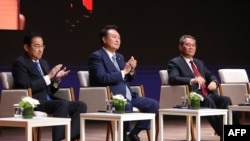Senior leaders from China, South Korea, and Japan pledged greater “practical cooperation” and danced around areas of disagreement as they met in Seoul Monday, reviving high-level dialogue for the first time in almost five years.
Chinese Premier Li Qiang hailed the meeting as “both a restart and a new beginning,” as he addressed reporters after meeting with South Korean President Yoon Suk Yeol and Japanese Prime Minister Fumio Kishida.
In a joint statement, the three countries vowed to speed up negotiations on a “high-quality” trilateral free trade deal and agreed to expand programs related to climate change, student exchanges, and disaster relief.
They also agreed to regularize the three-way talks, which had not occurred since 2019 because of the COVID-19 pandemic and frictions among the Asian powers.
China has watched warily as Japan and South Korea expand cooperation, not only between themselves but also with the United States, which Beijing fears is trying to contain its rise.
In their public statements Monday, the three leaders mostly focused on areas of cooperation. Maki Kobayashi, the press secretary for Japan’s Ministry of Foreign Affairs, described the talks as “very constructive.”
But contentious issues hovered over the discussions, especially after North Korea announced hours earlier that it plans to launch another military spy satellite into orbit by early next week.
Nuclear-armed North Korea has vowed to launch three satellites this year as part of an effort to monitor what it sees as U.S. military threats in the region.
Both Yoon and Kishida called on North Korea to scrap the planned launch, which they said would violate United Nations Security Council resolutions. China’s Li, however, called for “all parties to play a constructive role [and] stay committed to easing tensions.”
Hours after the meeting ended, South Korea’s military announced that it conducted attack drills Monday involving about 20 fighter jets, including F-35 aircraft, to “show the will and ability to punish the enemy’s provocation.”
China, which has a mutual defense treaty with North Korea, says South Korea and its ally the United States should focus on making concessions instead of applying military pressure toward Pyongyang.
According to the joint statement, China, Japan, and South Korea “reiterated positions” on the “denuclearization of the Korean Peninsula” and agreed “to continue to make positive efforts for the political settlement of the Korean Peninsula issue.”
In a separate meeting with Li Monday, South Korea’s presidential office said Yoon called on China to play a “constructive role” in maintaining the global nuclear non-proliferation regime and to help more with North Korean defectors.
China sees North Korean defectors as illegal economic migrants and regularly sends them back to their homeland, where they face punishment including forced labor, imprisonment, torture, or execution.
In response to Yoon’s request, Li said he is “well aware of the concerns of the Korean side” and wants continued communication on the matter, according to the South Korean presidential office.
Japanese officials also said many of the more sensitive discussions were held during bilateral talks between Kishida and Li on Sunday.
According to a Japanese statement, Kishida expressed “serious concerns” about China’s increasing military activities in the region, including in the East and South China Seas, and raised concerns about the situations in Hong Kong and Xinjiang, where Beijing is accused of human rights abuses.
Kishida also said Japan is “closely monitoring recent developments” in Taiwan, reiterating that “peace and stability across the Taiwan Strait is extremely important for the international community, including Japan.”
China last week conducted two days of large-scale military exercises encircling Taiwan, further raising tension around what is perhaps the most sensitive regional hotspot.
South Korea and Japan have grown bolder about speaking of the importance of preserving the status quo in democratic Taiwan, which China has threatened to take by force.
China strongly objects to such statements, insisting its relationship with Taiwan is a domestic matter. According to China’s Ministry of Foreign Affairs, Li told Kishida that Taiwan is at the “core” of Beijing’s interest, calling it a red line that must not be crossed.
At the start of his meeting with Kishida and Yoon, Li also seemed to criticize Japan and South Korea for working more closely with the United States.
“We must uphold the spirit of strategic autonomy, maintain bilateral relations, promote a multipolar world, and oppose playing bloc or camp politics,” Li said, according to Chinese state media.
Despite such frictions, leaders from all three countries said it was important that the trilateral dialogue continue, saying it was essential for resolving issues of concern.
“At the end of the day, neighboring countries need to coexist,” said Noriyuki Shikata, Japan’s Cabinet Secretary for Public Affairs. “We can’t just keep escalating tensions.”




